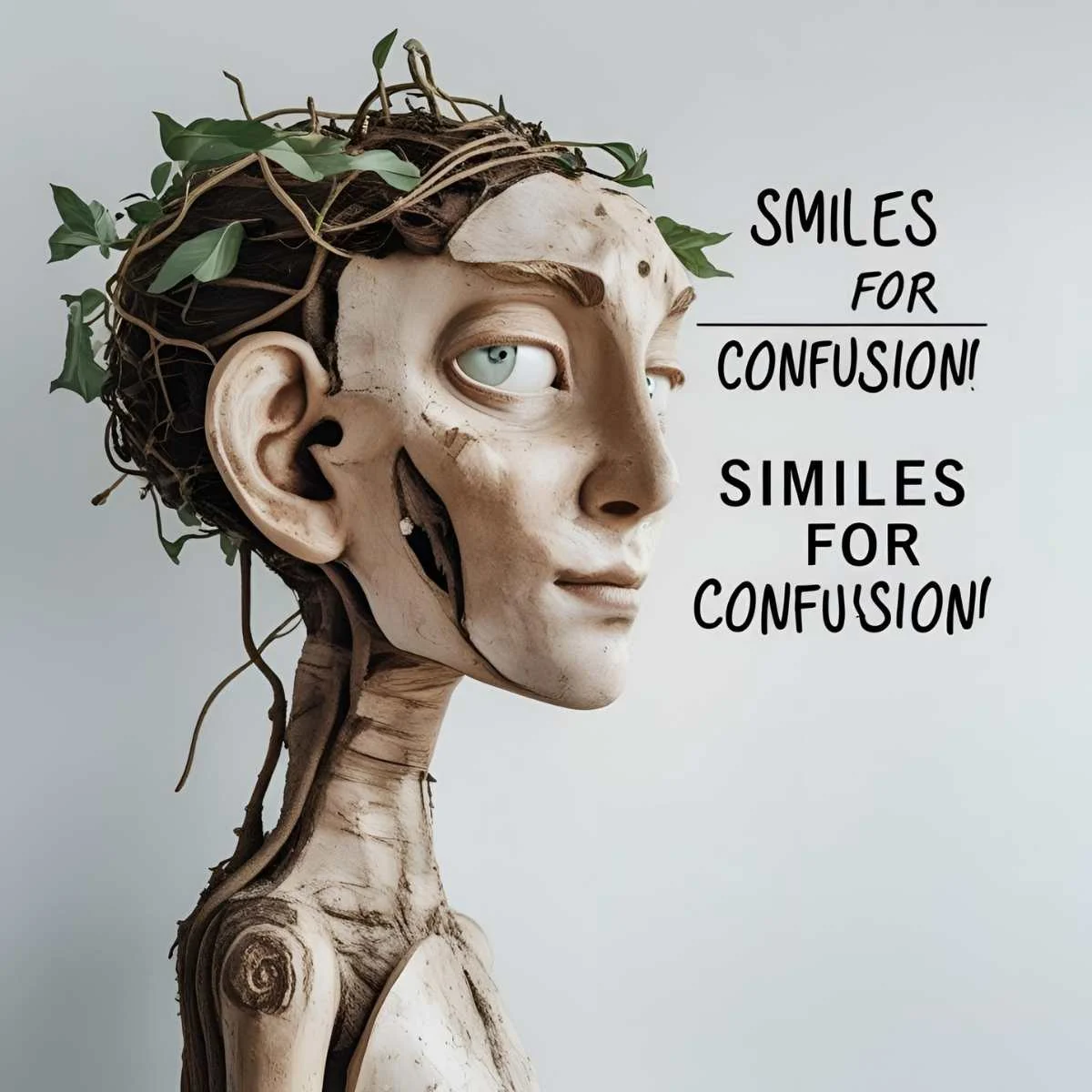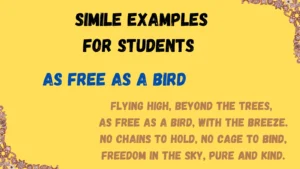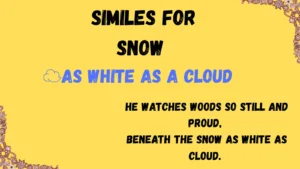Similes to Unravel Confusion’s Charm 🌀
Similes are like flashlights in a fog, illuminating ideas by comparing two unlike things with “like” or “as.” They transform vague feelings into vivid, relatable images, making emotions like confusion leap off the page or spark a laugh in conversation. Instead of saying, “I’m confused,” try “My mind’s like a tangled ball of yarn, knotted beyond repair.” Similes bring humor, clarity, and depth to the messy state of bewilderment, whether in essays, stories, or casual chats. Ever felt your thoughts scatter like leaves in a storm? Let’s explore 25 unique similes for confusion, grouped by theme, to make sense of the chaos! 🌪️
Similes for Confusion: 25 Vivid Comparisons
These 25 similes capture confusion’s whirlwind—mental fog, emotional tangles, or puzzled moments in daily life. Organized into thematic categories, each simile includes a meaning, a contextual example, and a specific application for writing, speaking, or joking. Let’s untangle the fun!
Confusion as Mental Fog 🌫️
Similes for when the mind feels lost or overwhelmed.
- Minds swirl like fog, blurring every thought.
Meaning: Confusion obscures clarity, like fog hides a landscape.
Example: In a math class scene, “Her mind swirled like fog, blurring the algebra equations.”
Application: Use in an essay about learning challenges or a text, e.g., “My brain’s fogged up in this lecture! 🌫️” - Thoughts drift like clouds, shapeless and fleeting.
Meaning: Confused thoughts float aimlessly, like clouds without form.
Example: In a journal entry, “His thoughts drifted like clouds, unable to grasp the philosophy text.”
Application: Perfect for reflective writing or a caption about feeling lost in thought. - Brains churn like muddy rivers, clouded with doubt.
Meaning: Confusion muddles the mind, like sediment clouds a river.
Example: In a study scene, “Her brain churned like a muddy river, drowning in chemistry terms.”
Application: Use in a blog about academic struggles or a tweet about exam stress. - Minds are mazes, twisting with no exit.
Meaning: Confusion traps thoughts in loops, like a maze with no way out.
Example: In a mystery novel, “His mind was a maze, twisting through the case’s clues.”
Application: Great for storytelling or a journal entry about problem-solving. - Thoughts scatter like dandelion seeds, blown by uncertainty.
Meaning: Confused ideas disperse chaotically, like seeds in the wind.
Example: In a poetry line, “Her thoughts scattered like dandelion seeds, lost in the breeze of doubt.”
Application: Use in creative writing or a social media post about feeling overwhelmed.
Confusion in Emotional Turmoil ❤️🩹
Similes for when confusion ties the heart in knots.
- Hearts tangle like yarn, knotted by mixed feelings.
Meaning: Emotional confusion creates a mess, like yarn in a tangle.
Example: In a romance story, “Her heart tangled like yarn, caught between love and fear.”
Application: Use in a love letter or a group chat about relationship drama, e.g., “My heart’s all tangled up! 🧶” - Minds spin like tops, wobbling with indecision.
Meaning: Confusion causes mental instability, like a top losing balance.
Example: In a coming-of-age tale, “His mind spun like a top, torn between college choices.”
Application: Perfect for a speech about decision-making or a journal about life choices. - Feelings are whirlpools, sucking thoughts into chaos.
Meaning: Emotional confusion engulfs the mind, like a whirlpool pulls in water.
Example: In a diary, “Her feelings were whirlpools, dragging her thoughts into heartbreak’s chaos.”
Application: Use in emotional writing or a text about a tough day. - Brains are jigsaw puzzles, missing key pieces.
Meaning: Confusion leaves gaps in understanding, like an incomplete puzzle.
Example: In a workplace scene, “His brain was a jigsaw puzzle, missing pieces of the project plan.”
Application: Great for a work email or a post about struggling with tasks. - Thoughts knot like shoelaces, tripping up clarity.
Meaning: Confused ideas tangle tightly, like shoelaces causing a stumble.
Example: In a teen novel, “Her thoughts knotted like shoelaces, tripping over the exam’s questions.”
Application: Use in a funny story or a caption about mental blocks.
Confusion in Everyday Chaos 🏃♂️
Similes for confusion in daily life or busy moments.
- Minds buzz like crossed wires, sparking with chaos.
Meaning: Confusion creates mental static, like wires sending mixed signals.
Example: In a busy morning scene, “His mind buzzed like crossed wires, juggling school and work.”
Application: Use in a blog about multitasking or a tweet, e.g., “My brain’s all crossed wires today! ⚡️” - Thoughts tumble like laundry, mixed up in the dryer.
Meaning: Confusion jumbles ideas, like clothes in a spin cycle.
Example: In a comedy skit, “Her thoughts tumbled like laundry, mixing deadlines and dinner plans.”
Application: Perfect for a humorous vlog or a chat about a hectic day. - Brains are traffic jams, stalled by too many ideas.
Meaning: Confusion halts thinking, like cars stuck in traffic.
Example: In a group project, “His brain was a traffic jam, stalled by conflicting opinions.”
Application: Use in a team reflection or a post about group work chaos. - Minds flail like kites, tangled in a storm.
Meaning: Confusion sends thoughts into disarray, like kites caught in wind.
Example: In a workplace story, “Her mind flailed like a kite, tangled in the new software’s rules.”
Application: Great for a tech blog or a journal about learning curves. - Thoughts are pinballs, bouncing without direction.
Meaning: Confused ideas ricochet aimlessly, like pinballs in a machine.
Example: In a classroom scene, “His thoughts were pinballs, bouncing through the lecture’s jargon.”
Application: Use in a funny essay or a text about losing focus.
Confusion as a Creative Spark 🎨
Similes for when confusion inspires or transforms.
- Minds bubble like soda, fizzing with wild ideas.
Meaning: Confusion sparks chaotic creativity, like soda bubbles overflowing.
Example: In an art class, “Her mind bubbled like soda, fizzing with abstract designs.”
Application: Use in a creative writing piece or a caption for an art project. - Thoughts swirl like paint, blending into new patterns.
Meaning: Confusion mixes ideas creatively, like paint on a canvas.
Example: In a poetry workshop, “His thoughts swirled like paint, creating a poem from chaos.”
Application: Perfect for a blog about inspiration or a post about brainstorming. - Brains are kaleidoscopes, twisting confusion into beauty.
Meaning: Confusion reshapes thoughts into unique patterns, like a kaleidoscope’s designs.
Example: In a creative story, “Her brain, a kaleidoscope, turned confusion into a bold idea.”
Application: Use in an artist’s statement or a speech about innovation. - Minds spark like firecrackers, bursting with puzzled insights.
Meaning: Confusion ignites unexpected ideas, like firecrackers explode.
Example: In a science fair, “His mind sparked like firecrackers, finding a solution mid-confusion.”
Application: Great for a science blog or a caption about problem-solving. - Thoughts dance like confetti, scattering in creative chaos.
Meaning: Confused ideas flutter freely, like confetti at a party.
Example: In a drama class, “Her thoughts danced like confetti, inspiring an impromptu script.”
Application: Use in a theater journal or a post about creative bursts.
Confusion with Cultural Flair 🌍
Similes inspired by cultural or historical imagery.
- Minds are labyrinths, lost in ancient riddles.
Meaning: Confusion traps thoughts, like a labyrinth hides the path.
Example: In a mythology tale, “His mind was a labyrinth, lost in the riddle’s twists.”
Application: Use in a history essay or a speech about tackling complex ideas. - Thoughts drift like lotus petals, floating in mystic doubt.
Meaning: Confusion feels ethereal and uncertain, like petals on water.
Example: In a cultural story, “Her thoughts drifted like lotus petals, unsure of the festival’s rules.”
Application: Perfect for a travel memoir or a post about cultural experiences. - Brains are bazaars, crowded with jumbled wares.
Meaning: Confusion overwhelms with mixed ideas, like a busy market.
Example: In a travel novel, “His brain was a bazaar, crowded with India’s sights and sounds.”
Application: Use in a cultural blog or a journal about sensory overload. - Minds hum like sitars, vibrating with tangled notes.
Meaning: Confusion creates a chaotic melody, like a sitar’s complex strings.
Example: In a music class, “Her mind hummed like a sitar, tangled in the new rhythm.”
Application: Great for a music essay or a caption about learning an instrument. - Thoughts are mosaics, piecing together shattered clarity.
Meaning: Confusion fragments understanding, like a mosaic builds from broken tiles.
Example: In a philosophy class, “His thoughts were mosaics, piecing together Kant’s ideas.”
Application: Use in an academic paper or a post about deep thinking.
Creative Examples to Light Up Confusion 💡
These similes turn confusion into a vivid, relatable experience. “Thoughts tumble like laundry” captures the chaos of a busy day, perfect for a sitcom script. “Minds are kaleidoscopes” transforms bewilderment into creativity, ideal for an artist’s blog. Ever felt your brain “flail like a kite” during a tough meeting? Try it in a work email for a laugh! Which simile sums up your last confused moment—pinballs or whirlpools?
Try This: Pick a simile and write a sentence about a recent confusing moment, like “My thoughts were pinballs during that math quiz! 🎰” Share it in a journal or with a friend.
Practical Applications for Every Mind ✍️
These similes can brighten your communication:
- Essays: Use “minds are mazes” in a college essay to describe overcoming academic challenges, e.g., “My mind was a maze, but I found the exit.”
- Stories: Add “thoughts are whirlpools” to a drama, showing a character’s emotional turmoil.
- Speeches: Say “Our minds bubble like soda with new ideas” in a team meeting to inspire creativity.
- Social Media: Post “Brain’s a traffic jam with these deadlines! 🚗” for a relatable work rant.
- Daily Chats: Toss “My thoughts are knotted shoelaces!” into a friend group text for a chuckle.
Challenge: Replace a dull sentence like “I was confused” with a simile, like “My mind buzzed like crossed wires.” Notice how it adds zing!
Conclusion: Embrace the Chaos with Similes 🌈
Similes are your secret weapon to make confusion a colorful, relatable adventure. From “foggy minds” to “mosaic thoughts,” these comparisons turn mental chaos into a story worth sharing. Why not give it a spin? Use a simile in your next essay, tweet, or chat—maybe “My brain’s a bazaar today!” Or create your own: are your thoughts a “tangled jungle”? Share it with a friend or post it online to spark a smile. Confusion’s just a canvas—paint it with similes and watch it shine! 🎨



